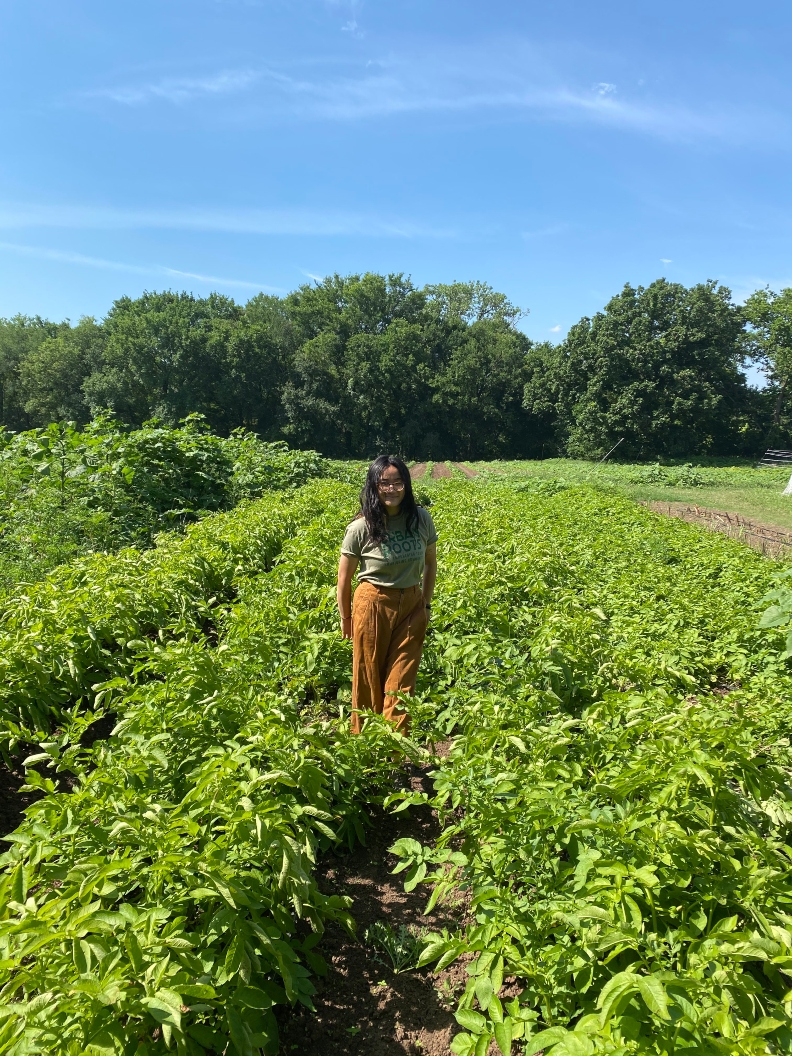Urban Roots Food and Leadership Fellow Lynn Huynh finds joy in connecting with the land.
By Lynn Huyn, Photo by Delaney Harris
The sound of our claps echoed across the 3.5 acres of land that we began our mornings with. As part of Urban Roots’ Food and Leadership Fellowship, my cohort spent the spring semester planting seeds and harvesting hundreds of pounds of vegetables on an urban farm. Much of this produce would go toward supporting food equity in Austin. This is work that we would celebrate with stretch circles, childhood games and TikTok dances. On this particular Thursday, I led our celebration with a clap, known as the Unity Clap. Not only to applaud our cohorts’ labor and love in tending the land, but also to unite us with the histories that came before us.
The Unity Clap is a solidarity practice that emerged from the United Farm Workers to bridge Filipinx and Latinx farm workers in their fight for better working conditions and increased wages. We begin the Unity Clap by beating at our own pace. At first it sounds chaotic and mismatched. Until we begin to listen to one another and fall into the same rhythm. This transcended the difference in language barriers and cultural backgrounds. Creating solidarity in United Farm Workers’ fight for better working and thus living conditions, as well as safety in one another’s commitment toward food justice. Thinking back, I can’t help but think about how our iteration of the Unity Clap reunites us with the generations of farm workers.
Everyone Has a place in the Urban Roots Movement
In a pandemic that seems never ending, with a labor shortage where service workers continue to strike, at a time when our food system is forever impacted by climate change, I find myself thinking about how the only act of permanence is our reliance on each other and our capacity to build the futures we deserve. This past year has seen the erection of community fridges in neighborhoods, a renewed interest in agricultural work and strikes across all vantage points of the food labor system.

Everyone has a place in this movement toward liberation from systems of oppression. For me, working in food justice is the realm where I do my part alongside the many other leaders, laborers and educators who paved the way. I imagine, grow and write about food until every neighborhood is able to practice their right to access, grow and eat the foods they have the sovereignty to. But I do it with you.
At Urban Roots, I am part of that system. Urban Roots is a nonprofit urban farm that produces over 40,000 pounds of sustainable produce each year through a multitude of practices. Crop rotation, no chemical pesticides and the use of compost. Half of the total produce is sold through CSA (Community Support Agriculture) shares and wholesale to support the youth programming. But the other half goes straight to fellow community organizations—such as Serafina, Go Austin/Vamos Austin and Out Youth—that deliver fresh, sustainable produce to Austin citizens who live in food-insecure environments. (Which are grievously created and maintained by positions of power in corporations and governments.) Above all, Urban Roots uses land stewardship and service as platforms to uplift high school and college-aged youth such as myself.
“And, of course, there is joy.”
From local agricultural coalition building to global food sovereignty, my education from Urban Roots’ programming has taught me how to value and participate in every aspect of the food system. This knowledge has transformed me into someone who is more critical of the world around us. More observant of how food moves from the land, to our hands, to our tables. In more personal ways, being on the farm has taught me how to be with myself. How to quell my anxiety, how to find solace in the empty pathways between the crop beds. And, of course, there is joy. I find an abundance of joy working with the earth. Surrounded by the stillness of the sky and the laughter of my fellows.
Here, we not only learn how to work with community partners, educate visitors of the farm, work alongside one another and take care of crops. We also learn how to build collective care and celebrate our relationships with ourselves, with each other, with our land. In a world that requires me to minimize myself in the spaces I navigate, every day spent at Urban Roots is a practice of celebrating myself.

